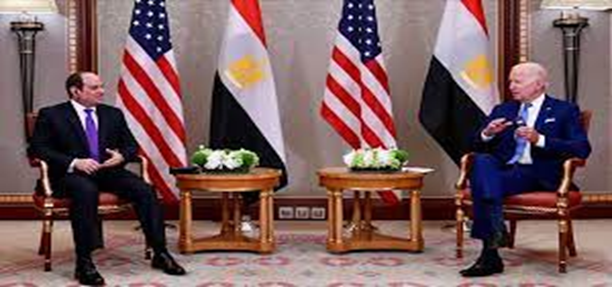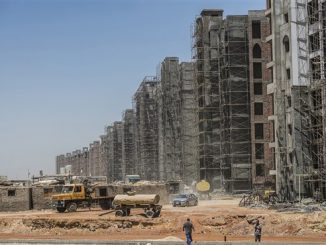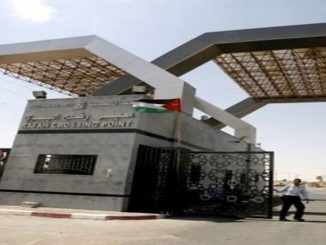
US President Joe Biden on Saturday 16 July actually met with Egypt’s dictator Abdel Fattah al-Sisi, calling him his “valuable, valuable friend“, to “reaffirm our shared commitment to the U.S.-Egypt strategic partnership, and to discuss regional and global challenges”.
The joint statement issued after the meeting added that they discussed the countries’ defense partnership and economic cooperation, the impact of the war in Ukraine, and the upcoming UN Climate Change Conference (COP 27) in Egypt.
It also said that Biden and al-Sisi “expressed their intention to meet again in the near future.”
The bottom of the statement notes that the pair “emphasized their mutual commitment to a constructive dialogue on human rights, which is an integral component of the strong U.S.-Egypt partnership.”
Biden and al-Sisi will “continue to consult closely on ensuring the promotion and protection of human rights and fundamental freedoms in political, civil, economic, social, and cultural fields.”
They also “reaffirmed the important role that civil society can play in these areas.”
The pair’s warm handshake and the statement—as well as Biden’s description of al-Sisi as a “valuable, valuable friend”—represented a stark change in attitude from Biden’s stance on the campaign trail, when he promised that there would be “no more blank checks for Trump’s ‘favorite dictator.’”
They also fell far short of demands from civil society and British and American lawmakers that Biden use the opportunity to highlight U.S. concerns about Egypt’s deplorable human rights record.
Unsurprisingly, the Egyptian readout made no mention of human rights, instead highlighting the presidents’ discussion of Palestine and the Grand Ethiopian Renaissance Dam (GERD).
On 11 July, members of the bipartisan Working Group on Egypt sent a letter to US President Joe Biden, urging him to use his meeting with Egypt’s Abdel Fattah al-Sisi to “make U.S. concerns about Egypt’s deplorable human rights record central to the conversation.”
The group also urged Biden to underscore to al-Sisi that “a more stable and secure region” can only be accomplished with tangible and authentic progress on human rights, the rule of law, and accountability, and that the United States’ strongest ties will be with governments that are committed to human rights and democratic values.
It also highlighted that “al-Sisi’s resurgent repression poses a threat to Egypt’s stability and to stability in the region. As we have seen before, including in Egypt, regimes that govern cruelly and without accountability breed alienation and discontent that can eventually tip into popular unrest, or worse.”
The working group also asked Biden to let Sisi know that “Senior Biden administration officials will be unable to attend the UN climate conference, COP27, that Egypt will host in Sharm el-Sheikh in November unless al-Sisi commits to welcoming local and international civil society, including peaceful protesters and media, without restrictions and takes meaningful steps to lessen pressure on Egyptian civil society and media beyond the conference. Such steps would include lifting travel bans and asset freezes on human rights defenders, freeing imprisoned journalists, and unblocking websites.”
Joint Statement:
The Joint Statement Following Meeting Between President Biden and Egypt’s Abdel Fattah Al Sisi in Jeddah
President Joseph R. Biden, Jr. met with Egypt’s Abdel Fattah Al Sisi today in Jeddah, Saudi Arabia to reaffirm their shared commitment to the U.S.-Egypt strategic partnership, consult on a broad range of global and regional security challenges, and advance the U.S.-Egypt relationship. In celebrating the milestone of 100 years of U.S.-Egypt diplomatic relations, Al Sisi and Biden expressed their intention to meet again in the near future to further enhance the two countries’ multi-faceted partnership. The two leaders renewed their commitment to the U.S.-Egypt Strategic Dialogue co-chaired by Secretary of State Antony J. Blinken and Minister of Foreign Affairs Sameh Shoukry and welcomed the continued implementation of its outcomes.
Strengthening our shared security
The decades-long U.S.-Egypt defense partnership remains a key pillar of regional stability. Both Presidents affirmed the importance of this partnership, which serves the interests of both countries. President Biden reiterated that the United States aims to continue to support Egypt in providing for its own defense, including through the continued provision of security assistance in consultation with the U.S. Congress. Both leaders affirmed their commitment to cooperate on counter-terrorism and welcomed the notable achievements of the Global Coalition to Defeat ISIS. Al Sisi expressed Egypt’s appreciation for military equipment and security assistance from the United States.
Advancing economic prosperity
Both leaders expressed their commitment to furthering bilateral economic cooperation for the mutual benefit of the Egyptian and American people. They decided to explore new ways to expand bilateral trade, increase private sector investments, and collaborate on clean energy and climate technology. The leaders welcomed the recent U.S. GreenTech Mission to Egypt, the largest in history, and committed to launch the high-level Joint Economic Commission.
The impact of the war in Ukraine
The United States and Egypt underlined that peace, security and a multilateral, rules-based order lie at the heart of their longstanding partnership. Recalling the March 2nd and March 24th United Nations General Assembly resolutions on Ukraine, which both voted in favor of, they reaffirmed their shared principles enshrined in the UN Charter, including the respect for international law, territorial integrity, and national sovereignty. The two leaders emphasized the need to refrain from the use of force, solve conflicts by peaceful means, and end violations of human rights in conflict areas. The United States and Egypt share particular concerns over the severe global consequences that stem from the war in Ukraine, including on global supply chains and energy and commodity prices. For example, the blockading of Black Sea ports has triggered rising food insecurity and levied significant economic pressures on Egypt.
President Biden underscored U.S. support for the Egyptian people in responding to these challenges. To this end, the United States commends Egypt’s consultations with the International Monetary Fund and supports the provision of additional funding to Egypt through the IMF’s Resilience and Sustainability Trust. The United States also lends its full support to Egypt’s engagement with the World Bank to seek financing options to stabilize its economy and strengthen the well-being of Egyptian households, in particular through the Crisis Response Finance Package recently announced by the Bank. President Biden conveyed that the United States is providing $1 billion in new assistance to address the food security situation in the Middle East, with $50 million specifically for Egypt. These funds aim to bolster food security and offset the effects of the disruption in agricultural supply chains and higher food prices due to the blocking of ports. Biden assured Al Sisi that the United States will advocate for Egypt and its food security needs.
Promoting regional stability
The United States and Egypt are cooperating closely to mediate solutions to regional conflicts and promote peace. The two leaders stressed that a two-state solution remains the only viable path to achieve a lasting resolution to the Israeli-Palestinian conflict and to realize a secure, prosperous, and dignified future for Israelis and Palestinians alike. President Biden expressed support for Egypt’s vital leadership and historic role in promoting peace and an end to the conflict, thereby expanding the circle of peace between Israel and its Arab neighbors and globally, as well as preserving sustainable calm between Israelis and Palestinians.
The two leaders underscored the need to implement United Nations Security Council resolutions 2570, 2571 (2021), reaffirming the necessity of holding presidential and parliamentary elections in tandem as soon as possible in Libya. They emphasized the importance of the full withdrawal of all foreign forces, mercenaries, foreign fighters, and the pivotal role of the 5+5 Joint Military Committee in this regard, including the prompt development of timelines. Biden thanked Al Sisi for Egypt’s role in helping to consolidate the Yemen Truce, particularly through facilitating commercial flights from Sana’a to Cairo, an important component of the UN-mediated truce arrangement. The two leaders committed to regular consultations to resolve regional conflicts and humanitarian crises in Syria, Lebanon, and Sudan. Regarding the Grand Ethiopian Renaissance Dam (GERD), President Biden reiterated U.S. support for Egypt’s water security and to forging a diplomatic resolution that would achieve the interests of all parties and contribute to a more peaceful and prosperous region. The two leaders reiterated the imperative of concluding an agreement on the filling and operation of the GERD without further delay as stipulated in the Statement of the President of the United Nations Security Council dated September 15, 2021, and in accordance with international law.
Promoting human rights
Biden and Al Sisi emphasized their mutual commitment to a constructive dialogue on human rights, which is an integral component of the strong U.S.-Egypt partnership. They will continue to consult closely on ensuring the promotion and protection of human rights and fundamental freedoms in political, civil, economic, social and cultural fields. The two leaders reaffirmed the important role that civil society can play in these areas.
Accelerating global efforts to tackle the climate crisis
Biden congratulated Al Sisi for Egypt presiding over the 27th United Nations Climate Change Conference (COP 27) in Sharm El Sheikh in November 2022 and reaffirmed the United States’ commitment to a successful Conference. The United States welcomes Egypt’s leadership in accelerating global ambition and action to tackle the climate crisis. President Biden welcomed Egypt’s submission of its updated nationally determined contribution (NDC). Both leaders emphasized their countries’ support for the Global Methane Pledge (GMP) and the new GMP Energy Pathway, which Egypt has joined with respect to the oil and gas sector. The two leaders reaffirmed the U.S. and Egypt’s new partnership on Adaptation in Africa, which the U.S. and Egypt will co-lead, focused on delivering concrete initiatives that will improve people’s lives and help build resilience to a changing climate. The leaders committed to convene the Joint U.S.-Egypt Climate Working Group as soon as possible.



